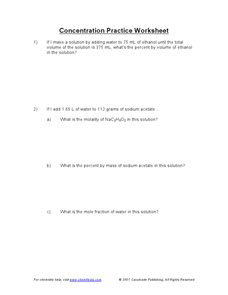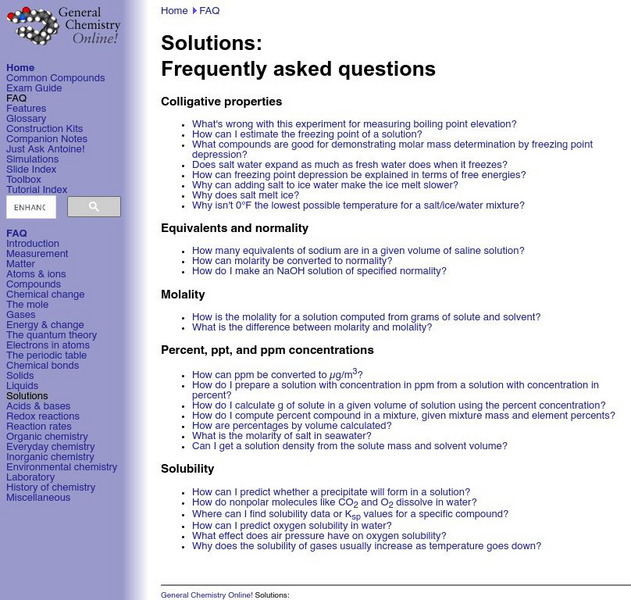Pingry School
Determination of Molar Mass by Boiling Point Elevation
Francis Raoult discovered the change in boiling points of solutions varies by the number of particles in the solution. Scholars apply the concept to determine the molality of a solution based on the change in boiling point. They use an...
LABScI
Freezing Point Depression: Why Don’t Oceans Freeze?
Can you go ice fishing in the ocean? Learners examine the freezing point of different saltwater solutions. Each solution has a different concentration of salt. By comparing the freezing points graphically, they make conclusions about...
Curated OER
Chapter 12 Review, Mixed Review: Solutions
Although there are only six questions on this chemistry handout, it makes a thorough review of solutions. Novices explain why a compound is not an electrolyte, identify types of compounds, and calculate moles, grams, and molalilties in...
Curated OER
WS 8.8 Molality and Colligative Properties
In this molality and colligative properties worksheet, students determine the molality of solutions and they calculate freezing point depressions and boiling point elevations of solutions.
Curated OER
Concentration Practice
In this concentration worksheet, learners find the percent volume of a compound in a solution and the molality of a solution. They determine the percent mass of a compound in a solution and they determine the mole fraction of water in a...
Curated OER
Concentration Practice
In this concentration instructional activity, students determine the molality, mole fraction, and the percent by mass for the given solution. This instructional activity has five problems to solve.
Curated OER
Solutions
In this solutions instructional activity, students calculate molality and mole fraction. Students define colligative property and determine what affects the solubility of gas in solvents. This instructional activity has 2 short answer...
Curated OER
Chemical Solutions
For this chemical solutions worksheet, Students determine the significance of the critical point in a phase diagram and rank solutions from weakest to strongest solute-solvent interaction. This worksheet has 4 problems to solve.
Curated OER
Colligative Properties
For this colligative properties worksheet, students calculate the concentration of solutions in molality for 4 word problems.
Curated OER
Concentration of Solutions
For this solutions worksheet, students determine how the amount of solute in a given amount of solvent effects the concentration of the solution. Students calculate the molarity of solutions. This worksheet has 7 fill in the blank, 3...
Curated OER
Concentration Problems
In this solutions worksheet, students calculate the concentration of solutions, or the mass and volume of given solutions. This worksheet has 10 problems to solve.
Curated OER
Solutions Worksheet
Students complete a worksheet on solutes in chemistry. They are given an equation in order to find the total mass solution, molarity, and molality.
Curated OER
Colligative Properties Worksheet
In this solutions worksheet, learners determine the boiling points and melting points of solutions. Students calculate the effective molality of a solute. This worksheet has five problems to solve.
Curated OER
Solutions Quiz Review Sheet
In this solutions activity, students use a phase diagram to determine the boiling point and molality of the solution. Students determine the electrical conductivity of a saturated solution. This activity has nine problems to solve.
CK-12 Foundation
Ck 12: Colligative Properties and Molality
[Free Registration/Login may be required to access all resource tools.] Students distinguish between types of solutions such as electrolytes and nonelectrolytes and unsaturated, saturated, and supersaturated solutions.
Frostburg State University
Frostburg State University: General Chemistry Online
Resource provides information about calculating molality.
Texas Instruments
Texas Instruments: Molality / Molarity
This activity is designed to assess the comprehension of concepts related to molality and molarity.
Frostburg State University
General Chemistry Online: Solutions Faq
An extensive list of frequently asked questions about solutions. Dive in and gain better understanding to things like molality and colligative properties throughout the study of solutions.
Khan Academy
Khan Academy: Molarity vs. Molality
Learn how molarity and molality differ. The molality of a solution is equal to the moles of solute divided by the mass of solvent in kilograms, while the molarity of a solution is equal to the moles of solute divided by the volume of...
Khan Academy
Khan Academy: Molarity, Molality, Osmolarity, Osmolality, and Tonicity What's the Difference?
See how each of these terms tells us something different about a solution.
Sophia Learning
Sophia: Molality: Lesson 2
This lesson introduces molality as a unit of concentration. Distinguish from molarity as a unit.























